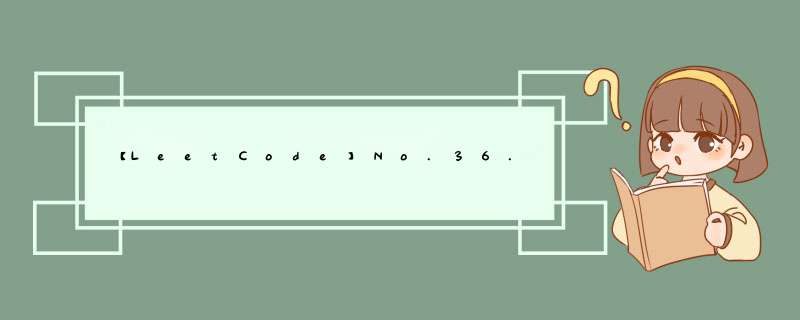
题目链接: https://leetcode.com/problems/valid-sudoku/
1. 题目介绍(有效数独)Determine if a 9 x 9 Sudoku board is valid. Only the filled cells need to be validated according to the following rules:
【Translate】: 确定9 x 9的 sudoku board是否有效。仅需要根据以下规则对填充的单元进行验证:
- Each row must contain the digits 1-9 without repetition.
- Each column must contain the digits 1-9 without repetition.
- Each of the nine 3 x 3 sub-boxes of the grid must contain the digits 1-9 without repetition.
【Translate】:
- 每一行必须包含数字1 ~ 9,不能重复。
- 每列必须包含数字1 ~ 9,不能重复。
- 网格的9个3 × 3子框中的每一个都必须包含数字1-9,不能重复。
Note:
- A Sudoku board (partially filled) could be valid but is not necessarily solvable.
- Only the filled cells need to be validated according to the mentioned rules.
【Translate】:
- Sudoku board (部分填满)可能是有效的,但不一定能解决。
- 只有填充好的单元才需要根据上述规则进行验证。
【测试用例】:
【约束】:
StefanPochmann 提供的题解 Short+Simple Java using Strings,想法非常好,直接一波遍历,利用HashSet自动去重的特性,反向求解,谁见了不说一声xiuer!
public boolean isValidSudoku(char[][] board) {
Set seen = new HashSet();
for (int i=0; i<9; ++i) {
for (int j=0; j<9; ++j) {
char number = board[i][j];
if (number != '.')
if (!seen.add(number + " in row " + i) ||
!seen.add(number + " in column " + j) ||
!seen.add(number + " in block " + i/3 + "-" + j/3))
return false;
}
}
return true;
}
Lorraine921 提供的题解 Shared my concise Java code,目前在Discuss中的Most Vote排名第二,仅次于StefanPochmann 。该题解的思想内核和上面StefanPochmann 的是一样的,但是让人疑惑的是速度为什么会快这么多?是分开存储搜索速度相对会更快一点,还是因为add()添加的元素大小的耗时差距比较大?
public boolean isValidSudoku(char[][] board) {
for(int i = 0; i<9; i++){
HashSet<Character> rows = new HashSet<Character>();
HashSet<Character> columns = new HashSet<Character>();
HashSet<Character> cube = new HashSet<Character>();
for (int j = 0; j < 9;j++){
if(board[i][j]!='.' && !rows.add(board[i][j]))
return false;
if(board[j][i]!='.' && !columns.add(board[j][i]))
return false;
int RowIndex = 3*(i/3);
int ColIndex = 3*(i%3);
if(board[RowIndex + j/3][ColIndex + j%3]!='.' && !cube.add(board[RowIndex + j/3][ColIndex + j%3]))
return false;
}
}
return true;
}
hsmishka 提供的题解 Yet another java 2ms solution,其思想是跟踪每一行、每列和3x3块(桶)。整数中的每1位表示:在这行/列/桶中找到了对应于这个位置的数字。公式(i / 3) * 3 + j / 3产生给定行和列的桶的索引。不得不说,位运算永远最神速!hset[i]用于当前行的重复元素检索,因为是|运算,所以它最终会包含该行所有数字对应的位数,逐次遍历就能筛选出是否有重复元素,其它case也同理。
public boolean isValidSudoku(char[][] board) {
int [] vset = new int [9]; // 列
int [] hset = new int [9]; // 行
int [] bckt = new int [9]; // 3x3块
int idx = 0;
for (int i = 0; i < 9; i++) {
for (int j = 0; j < 9; j++) {
if (board[i][j] != '.') {
idx = 1 << (board[i][j] - '0') ;
if ((hset[i] & idx) > 0 ||
(vset[j] & idx) > 0 ||
(bckt[(i / 3) * 3 + j / 3] & idx) > 0) return false;
hset[i] |= idx;
vset[j] |= idx;
bckt[(i / 3) * 3 + j / 3] |= idx;
}
}
}
return true;
}
[1] Java™ Platform Standard Ed. 7 Class HashSet
[2] Java HashSet类
欢迎分享,转载请注明来源:内存溢出

 微信扫一扫
微信扫一扫
 支付宝扫一扫
支付宝扫一扫
评论列表(0条)